Empowering students as civic actors and co-creators is one of the main goals of the PLACE Collaboratory. UMBC’s PLACE project leaders worked with eight undergraduate students who served as PLACE community fellows for the duration of the project: Alexis Stone, Briscoe Turner, Emily Paul, Nic Nemec, Shannon Cheek, Sydney Fryer, Tony Cano, and Violeta Brito. To support the fellows in their development as civic actors and co-creators, project leaders engaged them in community-building activities and provided training in community-based research methods and organizing techniques. Fellows had opportunities to get to know and learn with residents of Baltimore’s Brooklyn, Curtis Bay, and Brooklyn Park communities and students at Ben Franklin High School. Fellows learned to link their work in the local community with an exploration of their own stories, and to reflect on the relationships among their community-based research and engagement experiences and their own values and civic aspirations.
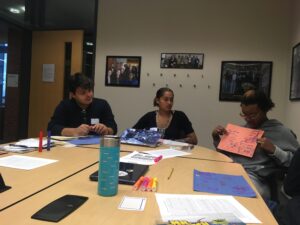
Community Building and Research Methods Training
In November 2019, Dr. Felipe Filomeno (PLACE co-principal investigator) and Dr. Romy Hübler (PLACE co-principal investigator) organized a community dialogue series consisting of three sessions occurring over three consecutive weeks with residents of Brooklyn, Curtis Bay and Brooklyn Park. Prior to the dialogue sessions, Felipe and Romy trained the UMBC PLACE community fellows in participant observation, cultural humility, and appropriate demeanor. Felipe and Romy facilitated the dialogues and the community fellows assisted with logistics, child care, and note taking. Fellows later transcribed and analyzed recordings of the dialogues. The analysis revealed three themes in residents’ concerns for the future of their communities: youth, public safety, and community engagement.
In Spring 2020, the UMBC PLACE community fellows enrolled in a three-credit political science research methods course (POLI 304: Community Research) taught by Felipe, Romy, and Dr. David Hoffman (Director, Center for Democracy and Civic Life, UMBC). The course trained the fellows and community members centrally involved in the project in public humanities research methods, and helped to build community among them. The course featured lectures, civic capacity-building activities, and community-based research workshops.
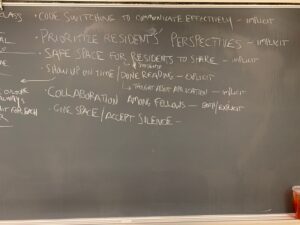
Lectures introduced students to public humanities research methods and provided opportunities for UMBC PLACE community fellows to consider how these methods could support the PLACE Project’s goal of empowering members of the local community to identify challenges, envision solutions, and develop an action plan. The textbook for the course was Research Methods for Cultural Studies (2008), edited by Michael Pickering, which includes chapters on experience and the social world, stories and the social world, investigating cultural producers, investigating cultural consumers, observations, analyzing visual experience, analyzing discourse, engaging with memory, and engaging with history.
Civic capacity building activities introduced UMBC PLACE community fellows to techniques for fostering strong community connections, and for generating collective wisdom and insights from knowledge people already have but may not have recognized or tapped. Fellows experienced the techniques as the instructors employed them, and learned how to apply them in their work in Brooklyn to connect people in ways that allow them to make meaningful contributions to their communities. The techniques included:
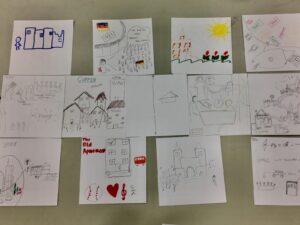
- A story circle: Facilitated reflection and discussion about fellows and instructors’ commitments to explore ways to make the Brooklyn community thrive.
- A peak experience activity: Facilitated reflection and discussion about moments in fellows and instructors’ lives when they felt most fully alive.
- Script analysis: Facilitated exercises in which fellows identified helpful and unhelpful scripts (cultural norms, stated or unstated, that guide people’s conduct and interactions) in the PLACE fellowship, POLI 304, and the Brooklyn community dialogues.
- A poem activity: Guided poem development that helped fellows and instructors to envision the world they want to create together; the better future they could imagine for themselves and their communities.
- A Civic Life Maxim activity: Facilitated conversation about four Civic Life Maxims (1. Civic life is everywhere, 2. People want to matter and belong, 3. Stories are everything, 4. Change happens) and their relevance to community-based work in Brooklyn.
-
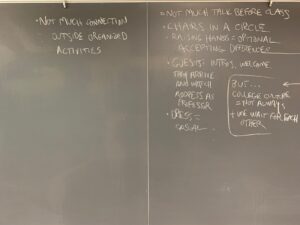
Script analysis of social norms in the classroom. A discourse analysis: Guided analysis of social media messages and program descriptions of two community organizations in Brooklyn.
- A POLI 304 story activity: Guided reflection on the story of fellows’ experiences with POLI 304 to reveal nuances of memory and how memories differ from person to person.
- A UMBC history activity: Guided exploration of UMBC’s history to demonstrate potential uses of historical research in community engagement work.
Several Brooklyn residents served as PLACE community fellows along with the UMBC students, and participated in some POLI 304 sessions. Members of the UMBC faculty and staff who conduct research in local communities using methodologies and methods from the public humanities, the humanistic social sciences, and/or community organizing led a series of workshops for the fellows. Topics included:
- Digital storytelling (Dr. Tania Lizarazo, Assistant Professor, Modern Languages, Linguistics, and Intercultural Communication)
- Oral history (Dr. Nicole King, Associate Professor and Chair, American Studies)
- Photovoice (Dr. Dawn Biehler, Associate Professor, Geography and Environmental Systems
- Community art (Steve Bradley, Associate Professor, Visual Arts)
- Community organizing (Dr. David Hoffman, Director, Center for Democracy and Civic Life)
- Social cohesion research (Dr. Marina Adler, Professor, Sociology, Anthropology, and Public Health)
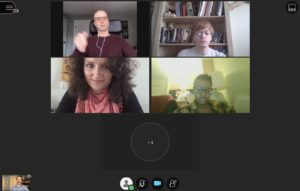
Most workshops took place in Brooklyn before the COVID-19 pandemic required all activities to move online in March 2020. The workshops on photovoice, community art, and community organizing took place virtually. Unfortunately, none of the Brooklyn residents serving as PLACE community fellows were able to attend virtual meetings due to their lack of access to the necessary technology and the impact of the pandemic on their lives.
Refocusing on Ben Franklin High School
The original plan for the UMBC PLACE Project involved working with residents in Brooklyn to develop plans to address local challenges that were grounded in their experiences and priorities. However, the COVID-19 pandemic made it impossible to meet residents in their neighborhood, hold in-person conversations, and participate in community programs. The UMBC team refocused its effort on Ben Franklin High School: a community institution with the capacity to enable virtual interactions between members of the UMBC team and a variety of stakeholders.
UMBC PLACE community fellows played a leading role in envisioning and achieving this shift. They considered the public humanities and community organizing methods they had learned about and made strategic recommendations about how to apply them in working with students, teachers, and other stakeholders at Ben Franklin.
The UMBC PLACE community fellows:
- Conducted virtual, structured interviews with members of the Ben Franklin High School staff to learn their perspectives on the aspirations and needs of local youth.
- Proposed a strategy for recruiting high school students to participate on the PLACE project team.
- Facilitated portions of virtual workshops for Ben Franklin High School students on community organizing, photovoice, digital storytelling, and art as an approach to pursuing social change.
- Participated in creating project materials, including a digital story focused on youth featuring photovoice and interviews.
The fellows also played a leading role in sharing experiences and lessons from the UMBC PLACE Project with other members of the national PLACE Collaboratory.